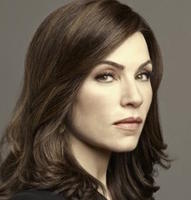 The Emmy Award-winning actor talks about her exceptional career and on knowing how to do your own taxes.
The Emmy Award-winning actor talks about her exceptional career and on knowing how to do your own taxes.
By Jake Stepansky '17
At the start of our phone interview, I ask Julianna Margulies how she’s doing. She replies: “You know what they never teach you in college? How to fill out your kid’s summer camp applications.” As someone who spent countless hours firmly locked in front of the television during the earliest seasons of Margulies’s acclaimed television show The Good Wife, I was relieved and enthralled to learn that the actress – whom I consider to be one of the greatest of all time – was gracious, humble, and remarkably human. Margulies, who starred for seven seasons as Alicia Florrick on The Good Wife, has an extensive film and television canon that has garnered her three primetime Emmy awards and eight Screen Actors Guild awards (the most of anyone in SAG). I spoke with Margulies about her development as an actor in advance of her master class at 2 p.m. Friday, April 7 in Farkas Studio. An edited version of our conversation follows.
What role did your education play in your development as an artist?
I don’t think I realized how much it influenced me until I was out of school. I had a Bachelor of Arts degree from Sarah Lawrence College and what I didn’t realize at the time was that all my courses – and

Talk to me about your artistic process and the relationships you cultivate through your work.
It depends on the job – whether I’m doing film, theater, or television. A television series is the best of both worlds and the worst of all worlds in that if you become complacent, the work will not be exciting – because every day it’s the same character. On The Good Wife, I played the same character for seven seasons – that’s ten-and-a-half months a year of playing the exact same character. I never found one day boring. I always found ways to grow with her. Television is not a director’s medium, because the director isn’t in control of the final product. I always feel bad for the directors who come onto television series – we had rotating directors (it takes them three weeks to prep, shoot, and post). Even when I was 26 years old on ER, directors would come on for an episode and say, “You know your character – I would never tell you what to do,” and I hated that. I always first and foremost go up to a director and say, “Please – direct me. I’m open. If I don’t agree with you, I’ll let you know.” You have to look at your work as a joint effort. I make sure the director knows I’m on their side. That can be tricky because sometimes you don’t agree with them, but I will always tell a director: let me try it your way first. Because you might discover things you didn’t know! When you’re working on one of these shows, your brain never rests, so you want someone else’s vision to support you. With theater, you just pray you have a great director. This is where I turn to the silver lining option – when you don’t have a great director, you learn from that too. It’s not always going to be roses, but you can make lemonade out of the lemons by saying, “OK, I can’t work that way, but how do I figure out how to.” It makes the next time you work with a difficult director much easier.
What challenges have you faced as a mother working in the entertainment industry?
I feel incredibly fortunate because by the time my kid was born, I was already pretty established. Here’s an example: the challenge of The Good Wife was that my kid was 13 months old and they offered me the show and they said we were going to shoot in L.A. Then I said I love this part, I love this show, I’m going to have to walk away. I’m a very fortunate position as a mother that they changed the location and brought it to New York. That’s rare. Now that I’m not on the show anymore, doing jobs that are not home are only for two or three weeks and it’s much more doable. Doing a television show is your life. I have yet to have anyone say, “We can’t hire her because of her schedule – she has a kid.” But I’ll tell you the one challenge for me as a mother. In the beginning, when he was a little baby and I was so exhausted, I never, ever, ever wanted anyone at work to know why, because I never wanted to hear, “Oh, it’s because it she has a kid.” I was never late, I always knew my lines, I was almost too hard on myself even if I had been up all night long because my kid had a fever and was vomiting. I never wanted to throw in the kid card because I thought it would ruin it for other women who were mothers. In that way, you work doubly hard and bandage up your exhausted self and not let them see it – you just put Band-Aids on anything. I could never come in and say, “I’m so sorry, I was up all night with my kid and I can’t do this scene” – ever. I’m not sure what would have happened if I did, but I always felt very responsible for other women to never have someone blame them for not getting a job because they were mothers.
What advice do you have for students looking to pursue careers in the performing arts?
Educate yourself to know exactly what it is you want to do. Constantly keep searching. Don’t ever settle for less than more. It’s important to learn your craft, whatever it is – that’s the most respectful thing you could do for yourself and your craft – you can never ever stop learning your craft. If that means going to apprentice someone, apprentice someone. If that means going to grad school, go to grad school. Give yourself a marker. My first marker was: if I can pay my rent and health insurance from acting (not waitressing), I’m going to keep doing this. Once I started paying my rent, I started asking: can I I kept setting myself these goals so that I felt like I was actually living off of my craft and not waitressing and wanting to act. Setting yourself goals and giving yourself a timeline can be one of the most valuable things because time goes really fast once you’re out of school. I have friends who are like, “Wait a minute – I’m 35 – I guess I’m not a writer anymore because I’m not making my living of off writing.” I gave myself five years – if in five years I’m not fully supporting myself acting, I’m going to go back to school and be a lawyer or a psychology. With that, it gave me a little more confidence when I walked into an audition, because I felt like I had a fallback. And learn how to do your own taxes.